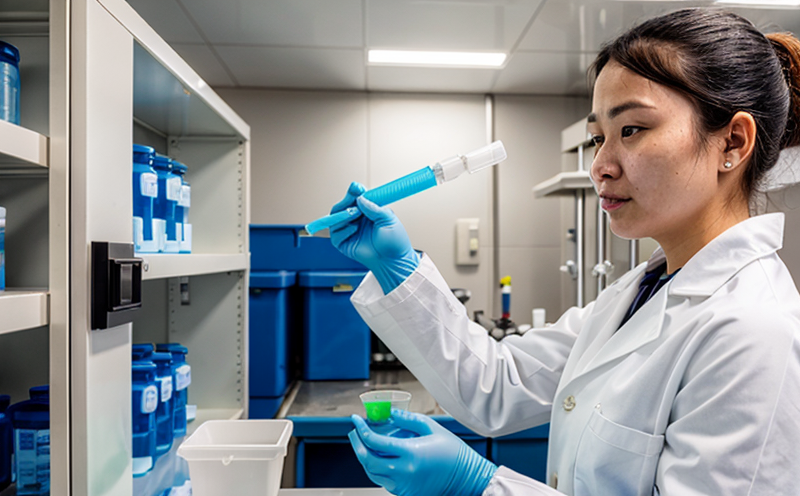USP Autoclave Microbial Validation Testing
The USP Autoclave Microbial Validation Testing is a critical component of ensuring product quality and safety in pharmaceutical manufacturing. This testing ensures that the autoclaving process employed by manufacturers meets the stringent requirements set forth by the United States Pharmacopeia (USP) for sterility assurance.
During this validation, various microorganisms are subjected to the same conditions as those experienced during the final product sterilization step in the manufacturing process. The objective is to determine whether these microorganisms can survive the autoclaving cycle used by the manufacturer. If a microorganism survives, it indicates that the sterilization method may not be adequate for ensuring sterility of the final product.
The testing process involves inoculating test samples with microorganisms, subjecting them to an autoclave under specified conditions (temperature, pressure, and duration), and then incubating these samples. If any colonies are observed after incubation, it is a sign that some microorganisms survived the sterilization step. This outcome necessitates further investigation into the process parameters or equipment.
For pharmaceutical companies, this testing ensures compliance with USP General Chapter Sterility Testing and USP General Chapter Validation of Sterilization Processes. Compliance with these standards is crucial for maintaining the integrity, safety, and efficacy of pharmaceutical products.
Microbiological validation testing plays a pivotal role in ensuring product quality by identifying potential weaknesses in sterilization procedures. It helps manufacturers avoid costly recalls and legal issues associated with non-compliance to regulatory requirements.
| Industry Applications |
|---|
| Pharmaceutical Manufacturing |
| Biotechnology Research and Development |
| Medical Device Manufacturing |
| Food Processing Industries |
- Ensures sterility assurance in final product sterilization.
- Meets USP General Chapter requirements for Sterility Testing and Validation of Sterilization Processes.
- Avoids potential quality issues and recalls due to non-compliance with regulatory standards.
Why It Matters
The importance of USP Autoclave Microbial Validation Testing cannot be overstated. This testing ensures that the sterilization process used by pharmaceutical manufacturers is effective in eliminating all viable microorganisms, including those that might be particularly resistant or difficult to kill.
Microbiological validation testing not only supports compliance with regulatory standards but also enhances product quality and patient safety. By ensuring that the final product is free from microbial contamination, this testing helps prevent potential health risks associated with contaminated drugs or devices.
The process of USP Autoclave Microbial Validation Testing involves several key steps: inoculation, autoclaving under specified conditions, and incubation followed by colony count. Each step must be meticulously controlled to ensure accurate results. The testing should replicate the actual manufacturing process as closely as possible to provide meaningful validation data.
Compliance with these rigorous standards is not just a legal requirement but also an ethical responsibility towards patients who rely on pharmaceutical products for their health and well-being. By adhering to these guidelines, manufacturers can build trust with healthcare professionals and consumers alike.
The results of this testing are used by quality managers and compliance officers to identify any areas where improvements might be needed in the sterilization process. This information helps R&D engineers refine their processes to enhance product safety and efficacy further.
Industry Applications
- Pharmaceutical Manufacturing: Ensuring that all products are free from microbial contamination, thereby protecting public health.
- Biotechnology Research and Development: Validating the sterilization processes used in the production of biologics and other complex pharmaceuticals.
- Medical Device Manufacturing: Guaranteeing that surgical instruments and implants meet strict sterility requirements.
- Food Processing Industries: Verifying the effectiveness of heat treatment methods used to ensure food safety.
The USP Autoclave Microbial Validation Testing is particularly important in these industries because it ensures that products are safe for consumption or use, reducing the risk of contamination and subsequent health hazards. This testing supports the overall goal of maintaining high standards of quality and reliability across all sectors involved in the production chain.
Quality and Reliability Assurance
The USP Autoclave Microbial Validation Testing is integral to ensuring consistent product quality and reliability within pharmaceutical manufacturing. It helps companies maintain a robust quality assurance system that adheres strictly to international standards such as ISO, ASTM, EN, IEC, and the USP.
This testing process involves multiple stages designed to simulate real-world conditions experienced during sterilization of final products. Key steps include inoculation with specific microorganisms, subjecting these samples to an autoclave under controlled parameters, and subsequent incubation periods followed by detailed observations for any growth or presence of viable colonies.
- Controlled Conditions: Ensures that the testing accurately reflects actual manufacturing processes.
- Data Collection: Provides comprehensive data on the effectiveness of sterilization methods against various types of microorganisms.
The results from this testing are crucial for continuous improvement efforts aimed at enhancing product quality and reliability. They inform decisions regarding process optimization, equipment maintenance, and potential upgrades to ensure ongoing compliance with regulatory requirements.
By integrating USP Autoclave Microbial Validation Testing into their standard operating procedures (SOPs), pharmaceutical manufacturers can demonstrate their commitment to excellence in manufacturing practices. This approach fosters trust among stakeholders while contributing positively to public health outcomes globally.





